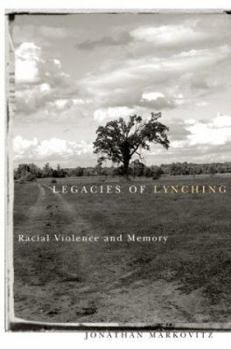Legacies of Lynching: Racial Violence and Memory
Traces the changing meanings of lynching and examines the political power of lynching as metaphor Between 1880 and 1930, thousands of African Americans were lynched in the United States. Beyond the horrific violence inflicted on these individuals, lynching terrorized whole communities and became a defining characteristic of Southern race relations in the Jim Crow era. As spectacle, lynching was intended to serve as a symbol...
Format:Paperback
Language:English
ISBN:0816639957
ISBN13:9780816639953
Release Date:June 2004
Publisher:University of Minnesota Press
Length:264 Pages
Weight:0.80 lbs.
Dimensions:0.6" x 6.0" x 8.9"
Customer Reviews
1 rating
Great exploration of the development and contemporary uses of the lynching metaphor
Published by Thriftbooks.com User , 18 years ago
Susan Smith. Do The Right Thing. Clarence Thomas. Jonathan Markovitz weaves together such disparate elements of contemporary culture into a narrative of how collective memories of lynching have shaped and reshaped modern uses of lynching as a metaphor for race relations. Legacies of Lynching argues "that collective memories of lynching are intricately linked to understandings of a variety of racial categories and that the ways in which we remember lynching therefore help to shape the possibilities for contemporary racial politics" (p. xvii). Markovitz begins his study by briefly tracing the history of lynching from its roots in American Revolution mob violence through its racialized uses, particularly in post-Reconstruction America. Markovitz's interests lie not in lynching itself but in how people have viewed lynching over time, in how the meaning(s) of lynching have been constructed and reconstructed. Drawing from Maurice Halbwachs and Marita Sturken, Markovitz argues that "the construction and deployment of collective memories is a thoroughly political process validating some versions of the past while marginalizing others" (p. xxii). The rest of his work illustrates how that process takes place in the realms of politics and popular culture. Markovitz's central argument, that lynching as a metaphor both shapes and is constructed by modern race relations, is well illustrated throughout his examples of collective memories of lynching. Through the place of the lynching metaphor in cinema, racialized violence, and the Hill-Thomas hearings, Markovitz demonstrates that "meaning does not reside within the photographs [the relics of lynching] but is, instead, determined through social interaction" (p. 141). In crafting a work accessible to scholars and to the public, Markovitz helps to define the meaning(s) of the lynching metaphor through examples that both play into and go beyond current culturally constructed senses of that metaphor. Only at the very end does Markovitz fall flat. In a one-page coda, Markovitz attempts to tie his work into the discourse of terrorism. Although he makes important points about the construction of collective memories of America before and after the terrorist attacks, this discourse only serves to distract the reader from Markovitz's important conclusions about battles over the cultural meanings of lynching and race relations. Markovitz instead should end with the assertion that "[t]he lynching metaphor, and collective memories of lynching, can be reconstructed and deployed in a wide variety of ways and for a seemingly endless number of purposes, but the meaning that is attached to lynching is never arbitrary" (p. 146). These battles over the meanings of lynching, of racism, of race itself, continue.





